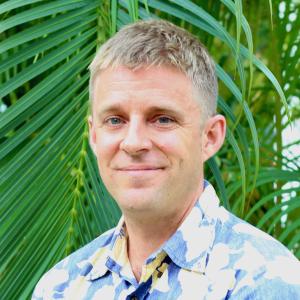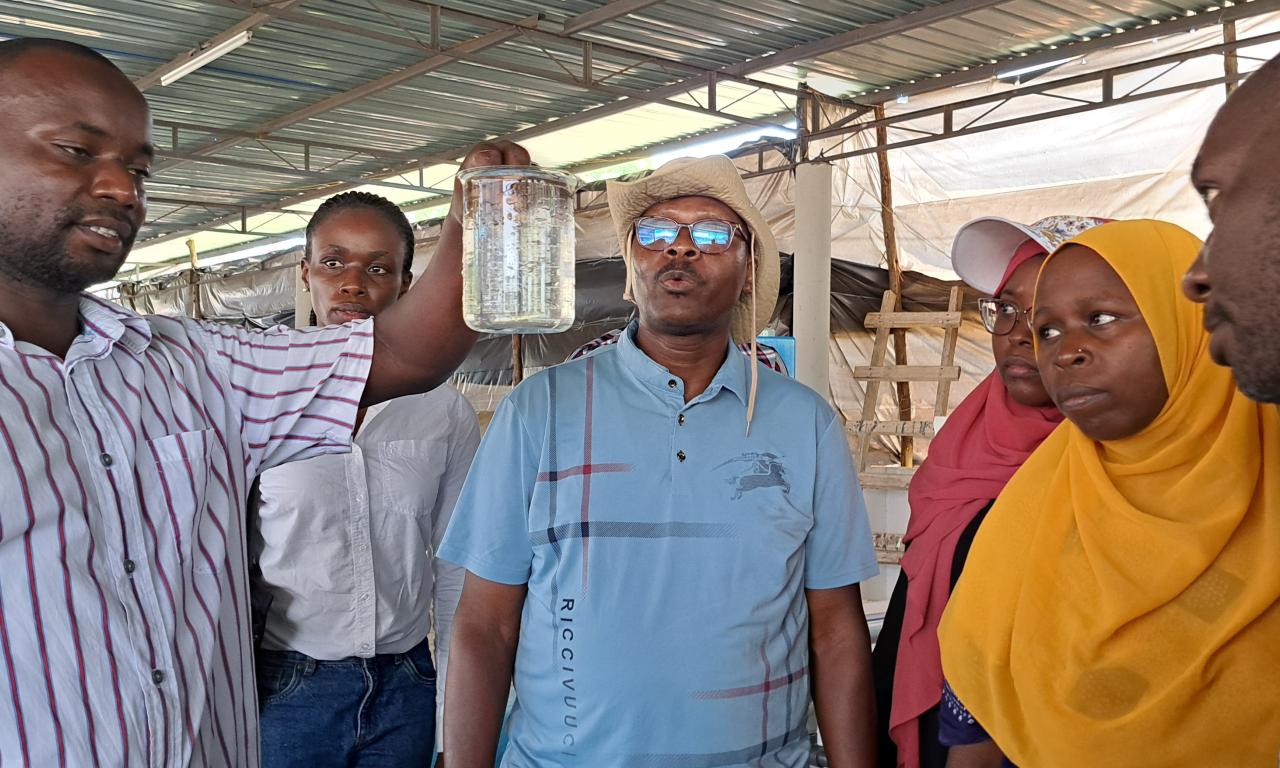
The three-day workshop and site visits brought together aquaculture stakeholders to focus on potential aquatic food and One Health challenges faced by mariculture farmers in coastal Kenya. What emerged was the importance of integrating IMTA practices and building stakeholder engagement to ensure a more sustainable aquaculture value chain.
A team of experts from WorldFish organized a health consultation workshop and field visits in the coastal region of Mombasa, Kwale and Kilifi in Kenya, between 7 to 9 October 2024. The workshop ‘Integrated Multitrophic Aquaculture (IMTA) Aquatic Animal Health Consultation’ was conducted under Work Package 2 of the Asia-Africa Bluetech Superhighway (AABS) being implemented by WorldFish.
The three-day event used a “One Health” approach to better understand the range of potential threats faced by mariculture farmers seeking to implement IMTA system in the coastal regions of Kenya. These include diseases that may affect seaweed and animals being cultured, potential environmental risks such as release of chemicals, human health, and food safety risks. Participants delved into the importance of collaboration with partners such as skilled veterinarians for ensuring healthy and thriving aquatic populations.
AABS aims to help restore marine and coastal ecosystems by developing sustainable and resilient aquatic food systems. The seven-year project supported by UK International Development under the Blue Planet Fund, aims to transform livelihoods of coastal communities across Asian and African countries with a primary focus on women and youth. In Phase 1, AABS aims to reach over 300,000 primary beneficiaries, at least 50% of them women and youth, and over 400,000 secondary beneficiaries across Bangladesh, Kenya, Mozambique, Nigeria and Tanzania.
Around 20 participants across government agencies, aquaculture associations, researchers from Kenya Marine and Fisheries Research Institute (KMFRI), aquaculture farmers and environmental organizations attended the workshop which was co-partnered with KMFRI.
WorldFish was represented by Dr. Jérôme Delamare-Deboutteville, Dr. Esther Wairimu, Douglas Okemwa, and Laura Khor.
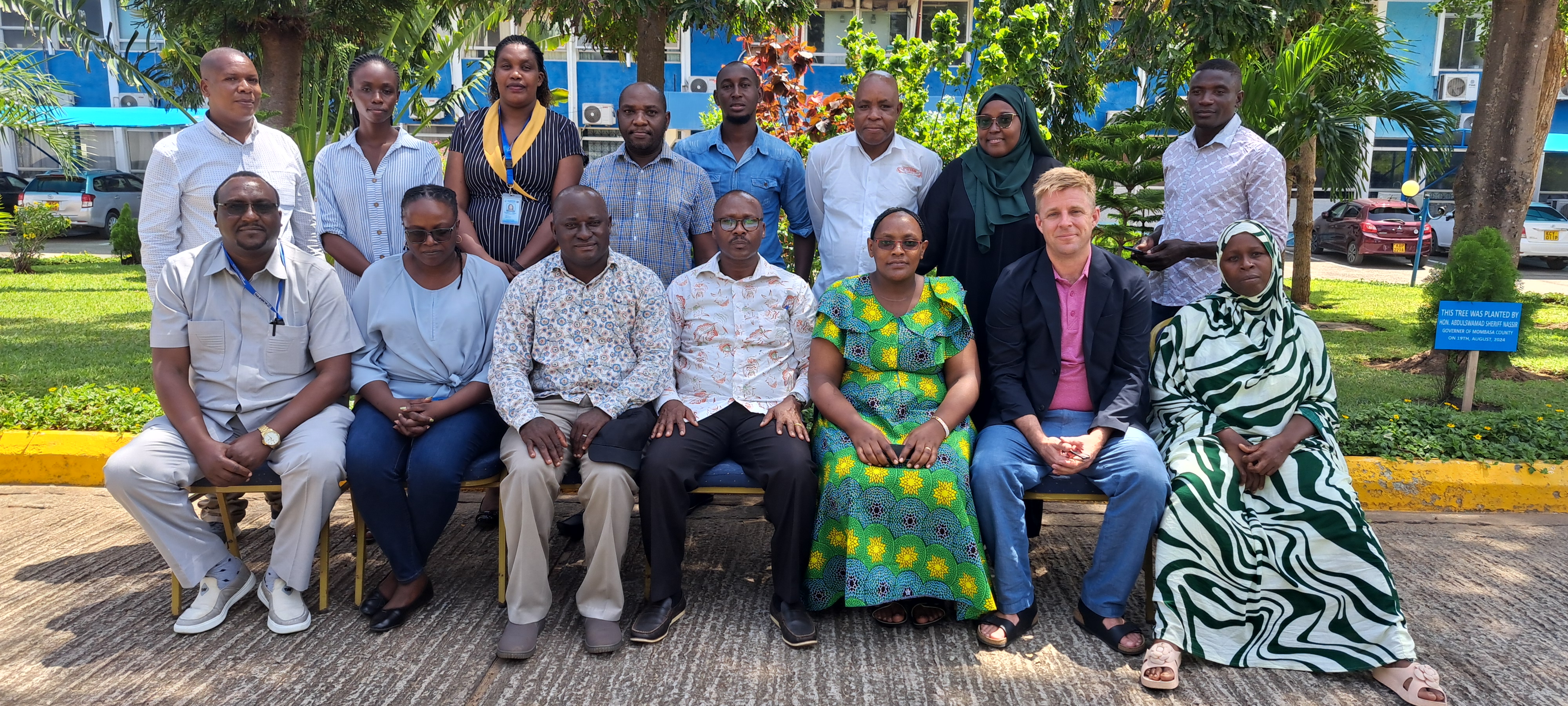
Workshop Explores Potential and Challenges of IMTA
During the various group and plenary sessions, aspects such as aquatic species, farming systems, health economics, biosecurity practices, inputs and outputs, and challenges encountered in IMTA farming practices were explored.
In his session on ‘Aquatic Animal Health: Role of Veterinarians in Kenya’, Dr. Wairia J.M, Office of the Directorate of Veterinary Services in Kabete, stressed on the need for skilled veterinarians in Africa, those who can be involved in the management, diagnosis and control, and prevention of aquatic and marine diseases.
“The responsibility for managing aquatic animal health is shared between the veterinary and fisheries authorities. Epidemiologic investigations should be done in a coordinated manner between the fisheries and the veterinary services to ensure that the farmers or the producers get the needed advice,” he said.
In her talk about ‘Integrated Multitrophic Aquaculture’ Esther Wairimu, research scientist at WorldFish based at KMFRI, gave an overview of the AABS project and how growth of aquaculture has been on an upward trend due to current global demand for fish and other seafood products. “This leads to a threat to the ecosystem due to lack of precautionary use of commercial fish feeds and other inputs. The possible remedy is the concept of IMTA which is gaining interest as part of Blue transformation programs. It applies an ecosystem-based approach and has environmental, economic and social benefits,” she said.
IMTA is a system in which waste materials from one species serve as food for the next creating a loop of healthy and sustainable aquaculture through bio-mitigation. Kenya is endowed with vast coastal and inland resources which have high potential for IMTA. Refer to the March 2024 workshop which discussed the potential of IMTA in Kenya.
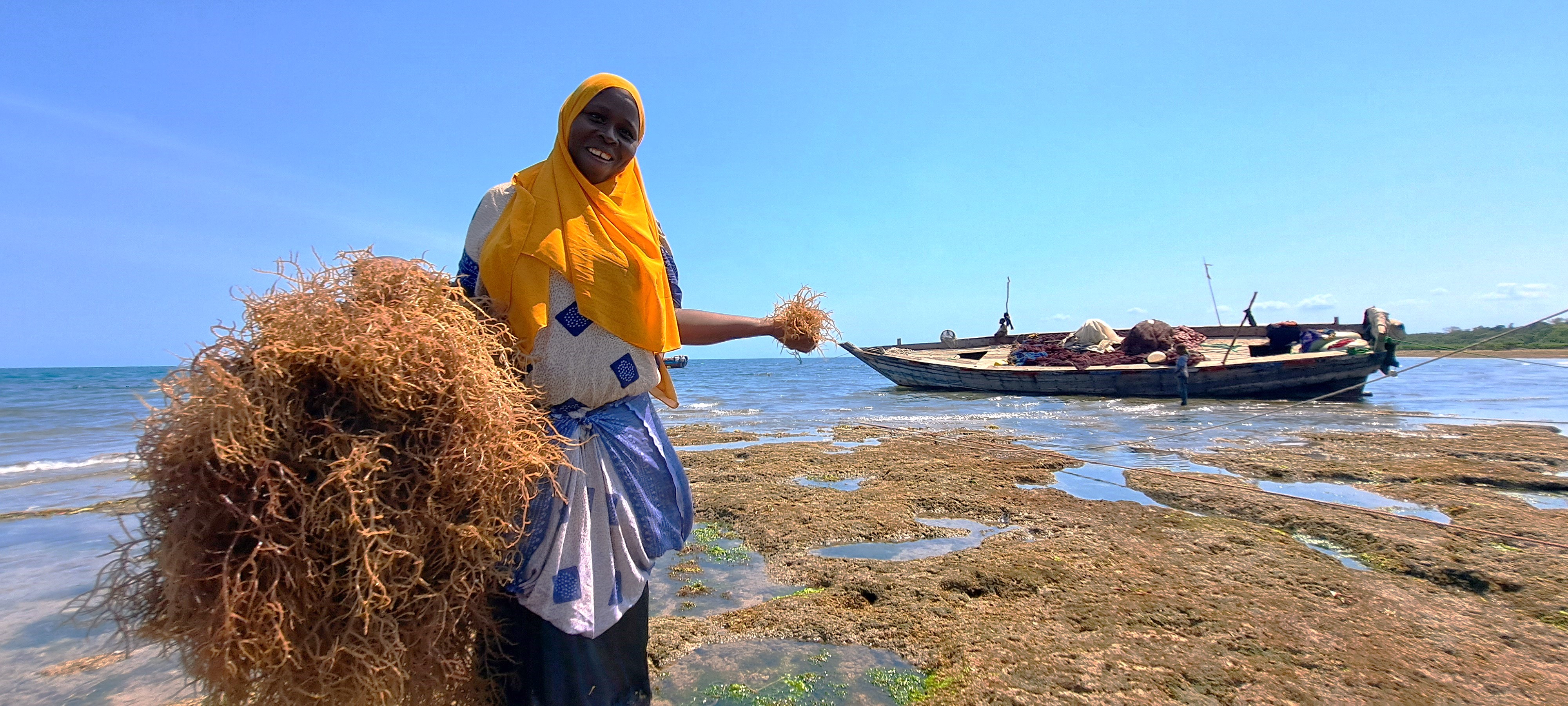
“The application of the concept is timely under the Blue Economy frontier to boost aquaculture production through species diversification and mitigate associated environmental impacts of aquaculture,” said participant Patrice Jilani Ngala, Deputy Director Kenya Fisheries Service Coast Region.
Dr. Wairimu also discussed the benefits and challenges of IMTA in Kenya.
“The need is for close collaboration and coordination among farmers while practicing different IMTA systems, understand and sensitize stakeholders on the principles and benefits of IMTA technology for sustainable aquaculture, knowledge sharing with stakeholders through workshops, conferences, reports, and peer reviewed publications.”
IMTA is one of the four work packages that AABS is implementing over seven years of the project to improve the livelihoods of vulnerable coastal communities and to restore marine and coastal ecosystems in countries across Africa and Asia.
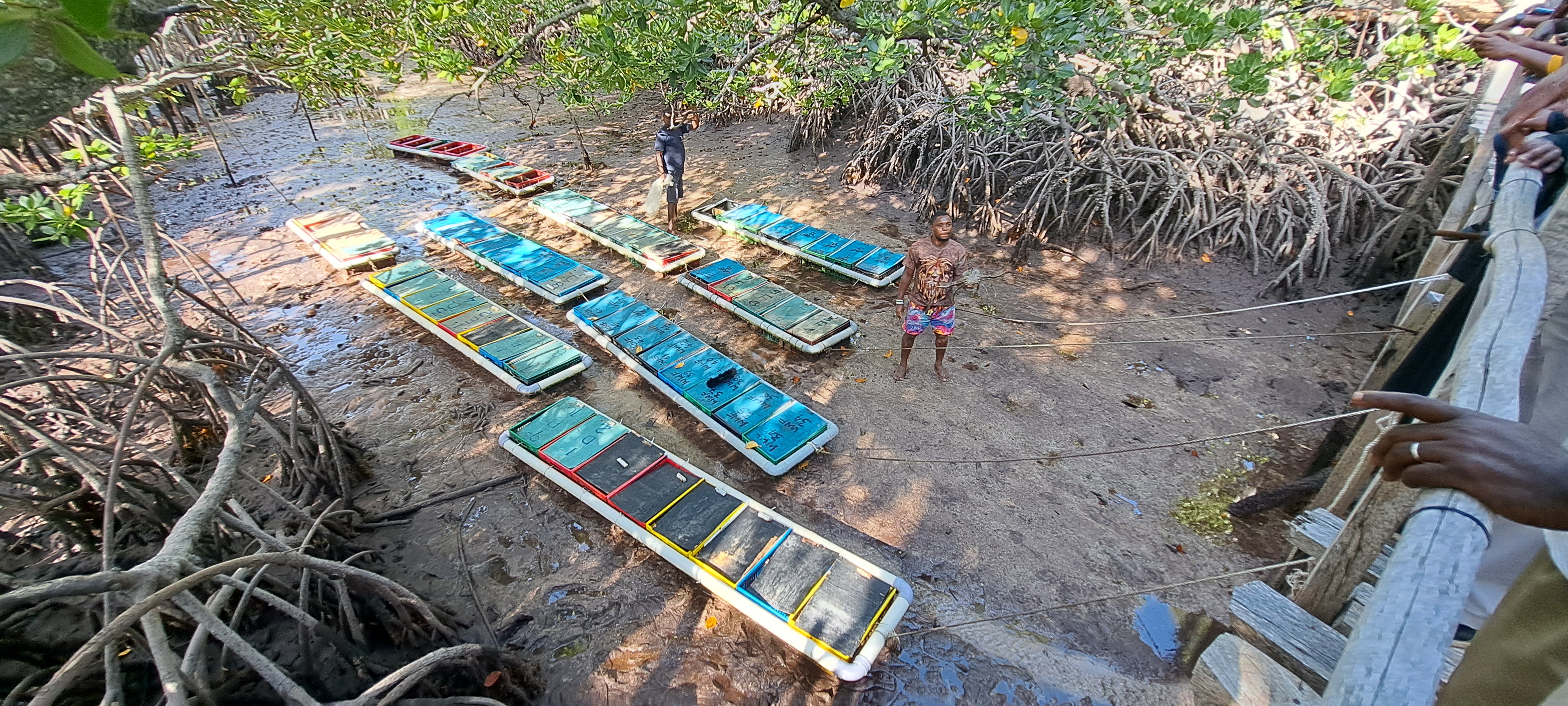
Field Visits Showcase Firsthand the Power of Mariculture
The next two days comprised field visits to the various training centers and aquaculture farming sites where mariculture of different organisms takes place. Participants visited the Kijiweni cage farming site, KMFRI Shimoni station, Kibuyuni seaweed farming, oyster farming site at Gazi Bay, Kwetu mariculture training site, Kibokoni finfish and prawn farming site. Participants also got a chance to visit Dabaso creek conservation site to witness ecotourism and mud crab fattening activities.
At the oyster farming site, participants witnessed firsthand the power of mariculture in supporting livelihoods and environmental conservation. Local farmer Gloria Justin explained how her oyster farm not only creates jobs for the local community but also contributes to improving water quality through natural filtration.
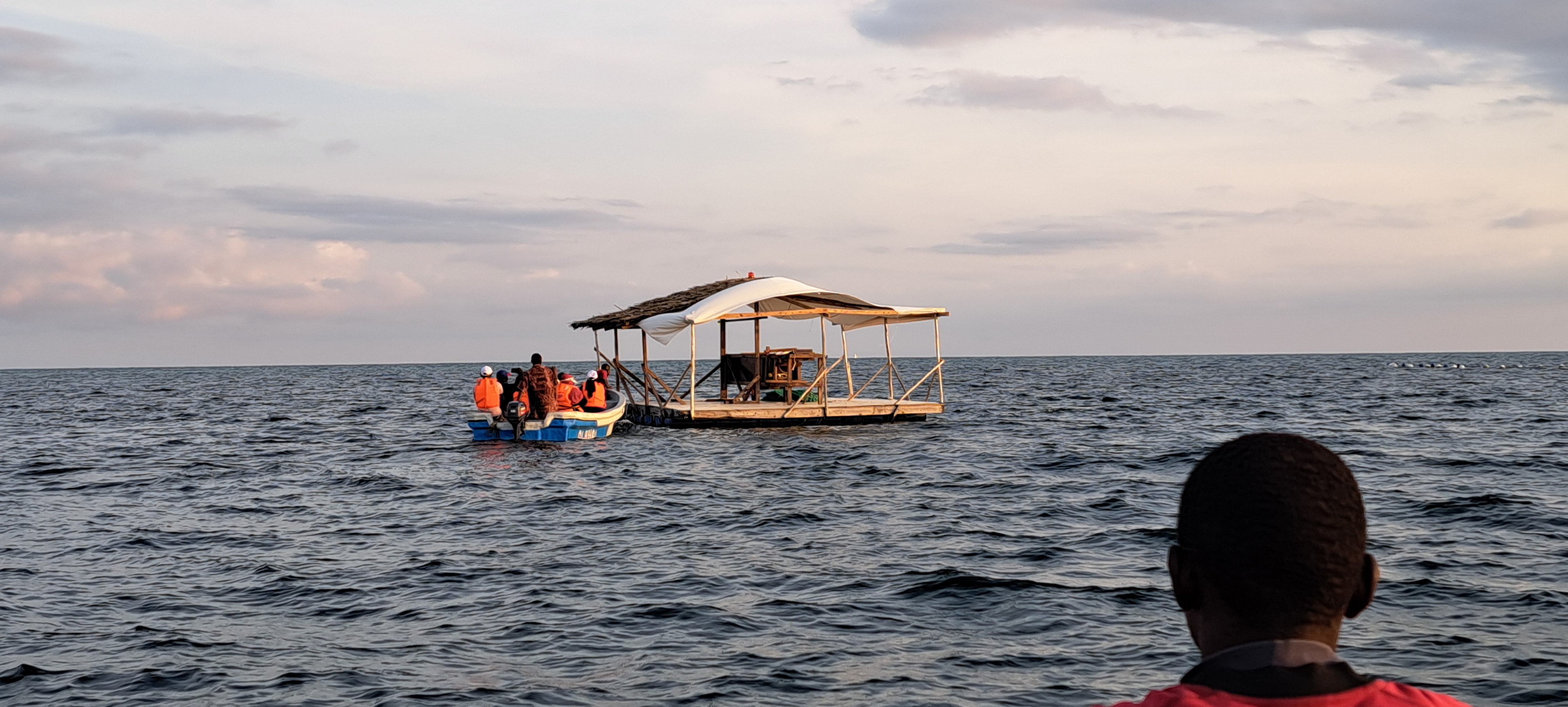
The visits highlighted the interconnected nature of mariculture systems, with participants observing how oysters, seaweed, fish, and other organisms create a self-sustaining ecosystem. This experience reinforced the importance of integrating IMTA practices to enhance resilience and reduce environmental impacts.
The workshop and field visits highlighted how ongoing collaboration among stakeholders can effectively address aquatic food and health challenges for IMTA in coastal Kenya. Adopting and scaling IMTA will be essential for balancing production goals and environmental sustainability.
“The AABS project will continue to engage stakeholders through follow-up discussions, technical support, and community-based training. “Future efforts will focus on monitoring the implementation of IMTA systems, strengthening biosecurity measures, ensuring health and food safety, and fostering innovative solutions for mariculture farmers,” said Dr. Jérôme Delamare-Deboutteville, WorldFish scientist. “By building capacity and creating inclusive opportunities for women and youth, AABS aims to position Kenya's aquaculture sector as a model for sustainable growth under the Blue Economy framework, providing a promising outlook for the future of aquaculture in Kenya," he added.
The next phase of activities will focus on identifying IMTA pilot sites and selecting optimal species combinations, with practical interventions designed to ensure resilient livelihoods and restore marine ecosystems.
